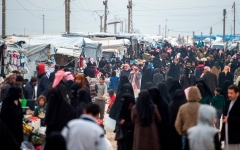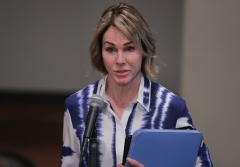
The overcrowded Al-Hol camp in northeastern Syria, where captured ISIS jihadists and family members are held along with others displaced by the fighting. (Photo by Fadel Senna/AFP/Getty Images)
(CNSNews.com) – President Trump has long expressed exasperation at European governments’ reluctance to repatriate captured ISIS fighters who are their citizens, and on Monday that frustration led to the U.S. veto of a U.N. Security Council resolution that failed to address the issue.
The resolution on the prosecution, rehabilitation and reintegration of foreign terrorist fighters (FTFs) won the support of all 14 other members of the council – voting remotely because of the COVID-19 pandemic – but the veto cast by U.S. Ambassador to the U.N. Kelly Craft killed it.
Introduced by non-permanent member Indonesia, the resolution sought to address how to deal with FTFs and their family members, tens of thousands of whom are still being held in northeastern Syria.
It called on U.N. member-states to integrate fighters back into society once they had served any sentences, to take measures to avoid radicalization and recruitment, and to provide support for family members, including “facilitating the return of the children to their countries of origin, as appropriate and on a case by case basis.”
But the draft contained no direct reference to terrorists’ repatriation to their countries of nationality, an issue which the Trump administration argues should be – in Craft’s words – “a crucial first step.”
“The United States provides the example here, bringing back our citizens and prosecuting them where appropriate,” she said in a statement after casting the veto. “All nations need to take responsibility for their citizens who engage in terror.”
According to the U.N. and aid agencies, around 65,000 people are being held in one camp in northeastern Syria alone, Al-Hol, overseen by Kurdish fighters who were U.S. allies in the fight against ISIS. The vast majority are women and children, and most are Syrian or Iraqi.
In a separate, more highly-secured area of the camp, more than 9,500 “third country nationals” are held, survivors of the U.S.-led campaign to eliminate the ISIS “caliphate.” Other foreign fighters are reportedly held in Kurdish-run prisons.
According to a report compiled for the French Senate in 2018, an estimated 5,000 Europeans traveled to Iraq and Syria to join ISIS, along with almost the same number of Russians or Russian-speakers, thousands of North African Arabs, and hundreds of other foreigners, including Americans. Many of the foreign fighters were killed during the conflict.
France and Britain in particular have resisted repatriating their FTF citizens, although some family members have been allowed to return on a case-by-case basis.
They are concerned about new attacks on their soil, a public backlash, and the difficulties in gathering sufficient evidence to secure convictions at home, preferring that the suspects be tried in the countries where the alleged crimes were committed. Iraqi courts have convicted and sentenced to death scores of foreign jihadists.
The U.S. was not alone among Security Council members in pressing for repatriation to be included in the resolution. Russia also called for it during negotiations on the text, although on Monday it chose not to vote no or abstain.
The Russian mission said afterwards it voted in favor, “guided by the necessity to maintain unity and effectiveness of the council when it comes to addressing the pressing challenges posed by terrorism.”
The mission also called on “all member-states to enhance efforts aimed at returning their nationals, whether involved in terrorist activities or accompanying terrorists, and abide by their obligations to bring these individuals to justice.”
‘Farce’
Craft’s statement, unlike Russia’s, made no mention of any perceived “necessity to maintain unity.”

U.S. Ambassador to the United Nations Kelly Craft. (Photo by EuropaNewswire /Gado/Getty Images)
On the contrary, she called the exercise “a cynical and willfully oblivious farce,” and declared herself “astonished by a rule of expediency over principle that so often afflicts this council. Far too often, a problem deferred or obscured is a problem supposedly solved.”
“Terrorist fighters and their families are easily ignored if they are someone else’s problem,” Craft said. “But I tell you now, and I say this with absolute conviction – failing to address head on the importance of repatriation will inevitably perpetuate the problem of terrorism.”
Trump has repeatedly criticized E.U. countries for refusing to take back their FTF citizens.
“I said to the European countries, I said to all of them, ‘Take the people back,’” he said at the White House last October, referring to the FTFs and their families.
“And they said, ‘No, no, no, we don’t want to do it. We don’t want them back,’” he said. “And they’re so used to the United States being a sucker, being a fool.”
Trump said the U.S. would not be bringing the foreign ISIS terrorists to Guantanamo Bay, and “paying to take care of them for the next 50 years.”
Earlier in the year, he tweeted that if Europeans did not take back their nationals among the hundreds of ISIS jihadists captured in Syria, the U.S. would be forced to release them.
“The US does not want to watch as these ISIS fighters permeate Europe, which is where they are expected to go,” he added.


